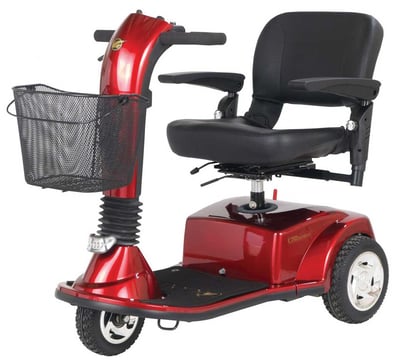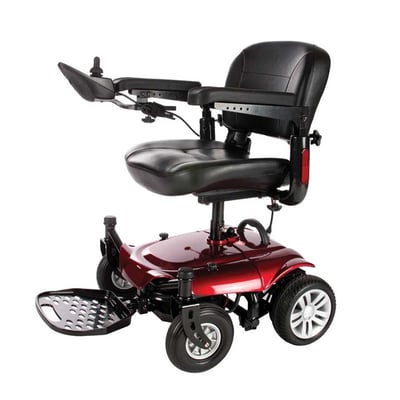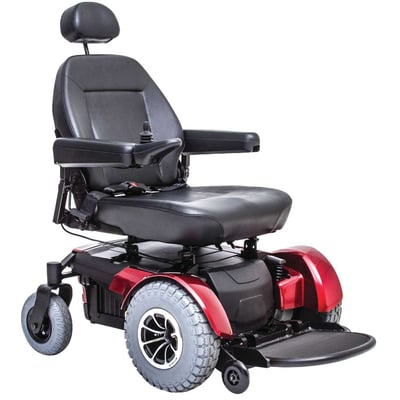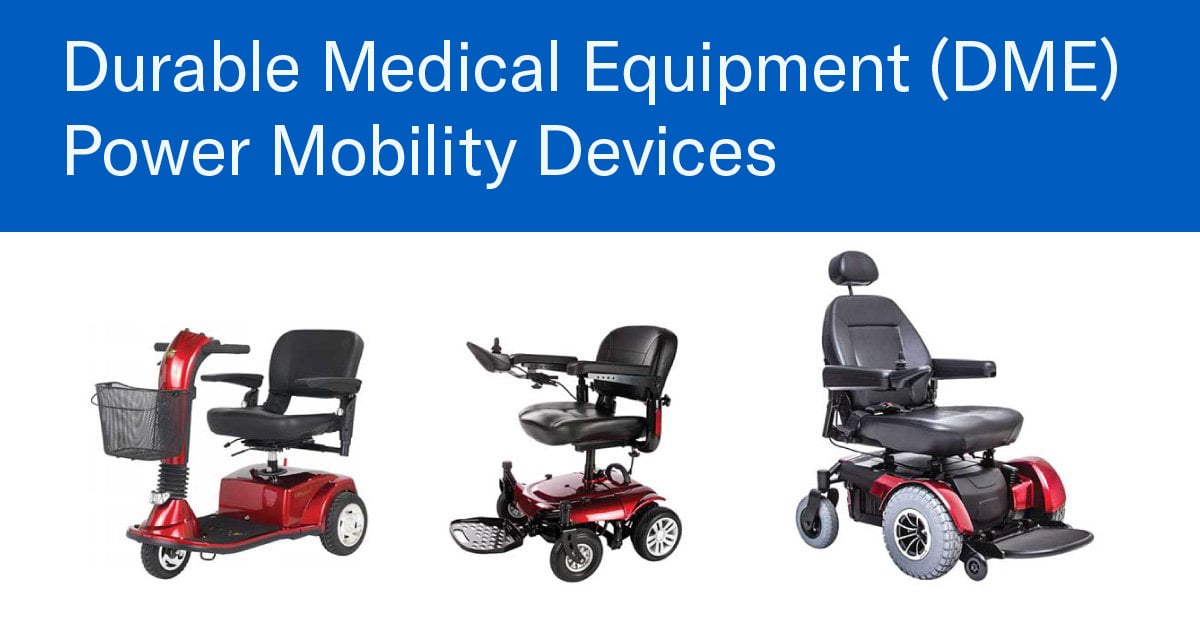There are two categories of equipment that have distinct requirements and criteria: Durable Medical Equipment (DME), and Complex Rehabilitation Technology (CRT). DME wheelchairs are the standard wheelchairs you see in hospitals or nursing homes and are purchased in bulk to meet short term needs. DME power mobility devices include scooters and standard power wheelchairs with a captain’s seat and back. Below we break down the criteria for each DME power mobility device. To see the basic power wheelchair criteria check out our Power Wheelchair Guide.
DME Power Operated Vehicle (POV)/Scooter

Meets all of the basic power wheelchair criteria
Scooters vs higher level bases:
A scooter will be often ruled out due to:
- Poor trunk strength
- Difficulty with transfers on/off the scooter
- Poor endurance
- Existing postural abnormalities
- Inability to operate the tiller
- Large turning radius
| *Very rarely does a scooter fit in the home so a Group 1 power wheelchair is the next base to consider! |
DME Group 1

The most basic power wheelchair
Meets all of the basic power wheelchair criteria and:
- Client will benefit from a narrower turning radius than a scooter or power operated vehicle (POV) and can be used in the home
- The client has no postural abnormalities and is not at risk for pressure injury
- Client is appropriate for basic seating that provides no extra stability or skin protection and cannot be replaced with rehab seating
- Client requires no power seat functions such as tilt or recline
| *Group 1 power wheelchairs are used to get around short to moderate distances on level surfaces such as the home, mall, or grocery store. |
DME Group 2

Typically characterized by "captain's seating"
Meets all of the basic power wheelchair criteria and:
- The client is unable to safely transfer, operate, and maintain postural stability in scooter
- The home does not provide adequate access for operating scooter
- The client is able to safely operate a power wheelchair OR has a caregiver willing to operate, who cannot push a manual wheelchair
- Group 2 will improve the ability to participate in MRADLs in the home
- Some Group 2 models have single and multi-power seating options available if they qualify for a tilt/recline system, or if they use a ventilator that is mounted on the wheelchair
- However, often the amount of tilt and/or recline that can be achieved with a Group 2 chair is not appropriate for clients dependent on these power seat functions for pressure reliefs/pressure injury prevention
Want more information on power wheelchairs? Check out our digital Power Wheelchair Guide here. Interested in our other education guides? Click here to see all of Permobil's education guides.
 Stacey Mullis, OTR/ATP
Stacey Mullis, OTR/ATP
Director of Clinical Marketing
Stacey serves as Director of Clinical Marketing for Permobil. A practicing OTR for over 20 years, she has experience in school-based pediatrics, inpatient rehabilitation, long term care, and home health. With her interest in wheelchair seating and positioning, Stacey engaged the challenges of providing appropriate seating in various clinical settings. She now uses this experience to develop programs and resources to educate clinicians on the principles of seating and wheeled mobility. She is passionate about equipping clinicians and through her previous role as Director of Clinical Education with Comfort Company and now with Permobil she has taught nationally and internationally to increase therapist capacity in this specialty area. Mullis graduated from Western University in London, Ontario, Canada with a BA Linguistics and BSc Occupational Therapy. She is a member of the NCOTA, CTF Executive Board, NRRTs, RESNA, and AOTA.
 Angela Regier, OTD, OTR/L, ATP/SMS
Angela Regier, OTD, OTR/L, ATP/SMS
Clinical Education Manager
Angela Regier, OTD, OTR/L, ATP received her doctorate of occupational therapy from Creighton University in 2007 and is a RESNA-certified assistive technology professional. Regier joined Permobil in 2017 as a Clinical Education Manager for the western region. Prior to joining Permobil, Regier was at Craig Hospital in Englewood, Colorado where her career focused on inpatient and outpatient spinal cord injury rehabilitation. Prior to leaving Craig Hospital, she was supervisor of the Wheelchair Seating and Mobility Clinic where she provided comprehensive seating and mobility interventions for individuals with acquired brain and spinal cord injury. Regier has published and speaks on the topic of seating and mobility for acquired brain injury and spinal cord injury. She has also served as an adjunct faculty for the Creighton University Entry-Level Distance OTD Program (Regis) in Denver, Colorado.

